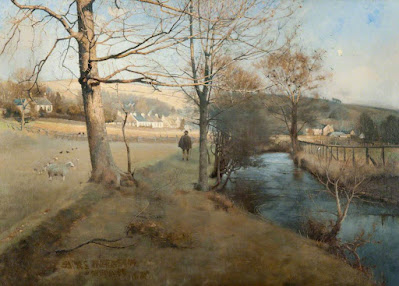Here is one way of looking at how we abide in the world:
"Experience, already reduced to a group of impressions, is ringed round for each one of us by that thick wall of personality through which no real voice has ever pierced on its way to us, or from us to that which we can only conjecture to be without. Every one of those impressions is the impression of the individual in his isolation, each mind keeping as a solitary prisoner its own dream of a world."
Walter Pater, "Conclusion," The Renaissance: Studies in Art and Poetry (Macmillan 1893), page 249.
I thought of Pater's passage after reading this:
Man in a Park
One lost in thought of what his life might mean
Sat in a park and watched the children play,
Did nothing, spoke to no one, but all day
Composed his life around the happy scene.
And when the sun went down and keepers came
To lock the gates, and all the voices were
Swept to a distance where no sounds could stir,
This man continued playing his odd game.
Thus, without protest, he went to the gate,
Heard the key turn and shut his eyes until
He felt that he had made the whole place still,
Being content simply to watch and wait.
So one can live, like patterns under glass,
And, like those patterns, not committing harm.
This man continued faithful to his calm,
Watching the children playing on the grass.
But what if someone else should also sit
Beside him on the bench and play the same
Watching and counting, self-preserving game,
Building a world with him no part of it?
If he is truthful to his vision he
Will let the dark intruder push him from
His place, and in the softly gathering gloom
Add one more note to his philosophy.
Elizabeth Jennings (1926-2001), Recoveries (Andre Deutsch 1964).
Pater's observation is one of the stepping stones that takes him, two paragraphs (and a few more stepping stones) later, to his well-known prescription for how to live: "To burn always with this hard, gem-like flame, to maintain this ecstasy, is success in life." (Walter Pater, The Renaissance: Studies in Art and Poetry, page 251.) But burning with a gem-like flame is not our concern at the moment, dear readers. (Mind you, I say that as one who is quite fond of Pater.)
Rather, our concern is how to get through "an ordinary Wednesday afternoon" (to borrow from Walker Percy). In her own quiet, lovely fashion, Jennings shows us a "mind keeping as a solitary prisoner its own dream of a world." The man in the park may not be a complete stranger to some of us. I suspect he was not a complete stranger to Jennings. Like Pater, she goes a step further (but in her own way), and gives us those wonderful, beautiful, and mysterious final eight lines, which seem to be about getting through an ordinary Wednesday afternoon.
James Paterson (1854-1932), "Moniaive" (1885)
An observation by Thomas Hardy comes to mind: "The most prosaic man becomes a poem when you stand by his grave at his funeral and think of him." (Thomas Hardy, notebook entry for May 29, 1871, in Richard Taylor (editor), The Personal Notebooks of Thomas Hardy (Macmillan 1978), page 10.) In saying this, Hardy knew full well that he, too, was a "prosaic man." (I base this thought on having read accounts of Hardy by those who met him. Selections of these accounts may be found in Martin Ray (editor), Thomas Hardy Remembered (Ashgate 2007) and James Gibson (editor), Thomas Hardy: Interviews and Recollections (Macmillan 1999). Both books are delightful.)
Well, we are all prosaic women and men, aren't we? To think otherwise is self-deception. Perhaps Elizabeth Jennings' wonderful closing lines are relevant: ". . . and in the softly gathering gloom/Add one more note to his philosophy." Isn't this a variation upon Hardy's thought? Are we indeed all strangers to one another?
Lot 304: Various Books
There are always lives
Left between the leaves
Scattering as I dust
The honeymoon edelweiss
Pressed ferns from prayer-books
Seed lists and hints on puddings
Deprecatory letters from old cousins
Proposing to come for Easter
And always clouded negatives
The ghost dogs in the vanishing gardens:
Fading ephemera of non-events,
Whoever owned it
(Dead or cut adrift or homeless in a home)
Nothing to me, a number, or if a name
Then meaningless,
Yet always as I touch a current flows,
The poles connect, the wards latch into place,
A life extends me --
Love-hate; grief; faith; wonder;
Tenderness.
Joan Barton (1908-1986), The Mistress and Other Poems (The Sonus Press 1972).
Joan Barton wrote poems from an early age, but she did not become well-known as a poet until Philip Larkin chose to include one of her poems in The Oxford Book of Twentieth-Century English Verse (Oxford University Press 1973), which he edited. With respect to "Lot 304: Various Books," it may be helpful to know that Barton was a bookseller for much of her life.
A summer shower;
A woman sits alone,
Gazing outside.
Kikaku (1661-1707) (translated by R. H. Blyth), in R. H. Blyth, Haiku, Volume 3: Summer-Autumn (Hokuseido Press 1952), page 67.
What is one to do about "that thick wall of personality"? Is it possible to abandon, or to escape from, our "own dream of a world"? I'm not wise enough to provide answers to either of those questions. I'm afraid the best I can do is to return to these lines, which have appeared here on several occasions over the years: ". . . we should be careful//Of each other, we should be kind/While there is still time." (Philip Larkin, "The Mower.")
The long night;
A light passes along
Outside the shõji.
Masaoka Shiki (1867-1902) (translated by R. H. Blyth), in R. H. Blyth, Haiku, Volume 3: Summer-Autumn, page 356.
Alfred Parsons (1857-1920), "Meadows by the Avon"









